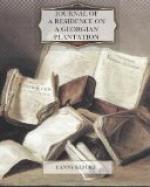I once heard a slave on the plantation of an absentee express the most lively distress at hearing that his master was ill. Before, however, I had recovered from my surprise at this warm ‘attachment’ to a distant and all but unknown proprietor, the man added, ’massa die, what become of all him people?’
On my arrival on the plantation where I resided, I was hailed with the most extravagant demonstrations of delight, and all but lifted off my feet in the arms of people who had never seen me before; but who, knowing me to be connected with their owners, expected from me some of the multitudinous benefits which they always hope to derive from masters. These, until they come to reside among them, are always believed to be sources of beneficence and fountains of redress by the poor people, who have known no rule but the delegated tyranny of the overseer. In these expectations, however, they very soon find themselves cruelly mistaken. Of course, if the absentee planter has received a satisfactory income from his estate, he is inclined to be satisfied with the manager of it, and as subordination to the only white man among hundreds of blacks must be maintained at any and every cost, the overseer is justified and upheld in his whole administration. If the wretched slave ever dared to prefer a complaint of ill-usage the most atrocious, the law which refuses the testimony of a black against a white is not only the law of the land, but of every man’s private dealings; and lying being one of the natural results of slavery, and a tendency to shirk compelled and unrequited labour another, the overseer stands on excellent vantage-ground, when he refers to these undoubted characteristics of the system, if called upon to rebut any charge of cruelty or injustice. But pray consider for a moment the probability of any such charge being preferred by a poor creature, who has been for years left to the absolute disposal of this man, and who knows very well that in a few days, or months at furthest, the master will again depart, leaving him again for months, perhaps for years, utterly at the mercy of the man against whom he has dared to prefer a complaint. On the estates which I visited, the owners had been habitually absent, and the ‘attachment’ of slaves to such masters as these, you will allow, can hardly come under the denomination of a strong personal feeling.
Your authority next states that the infirm and superannuated slaves no longer capable of ministering to their masters’ luxuries, on the estate that he visited, were ending their lives among all the comforts of home, with kindred and friends around them, in a condition which he contrasts, at least by implication, very favourably with the workhouse, the last refuge provided by the social humanity of England—for the pauper labourer when he has reached that term when ‘unregarded age is in corners thrown.’ On the plantation where I lived the infirmary was a large room, the walls of which were simply mud and lathes—the




